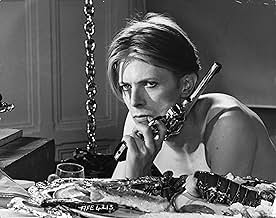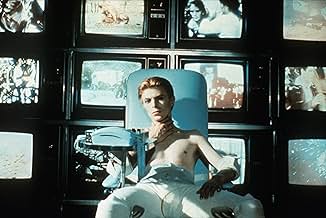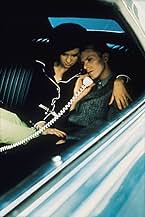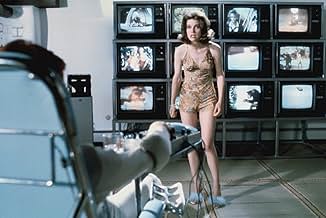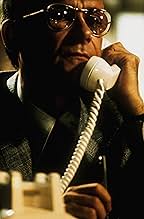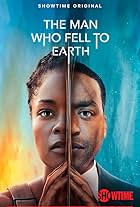An alien must pose as a human to save his dying planet, but a woman and greed of other men create complications.An alien must pose as a human to save his dying planet, but a woman and greed of other men create complications.An alien must pose as a human to save his dying planet, but a woman and greed of other men create complications.
- Awards
- 1 win & 4 nominations total
Jim Lovell
- Capt. James Lovell, Commander of Apollo 13
- (as Capt. James Lovell)
Dort Clark
- Waiter
- (uncredited)
- Director
- Writers
- All cast & crew
- Production, box office & more at IMDbPro
Featured reviews
I have just watched "The Man Who Fell to Earth" from beginning to end after seeing several scenes here and there from years of flipping past the sci-fi channel or whatever other channel this film might've been shown on. I must say that I think it is one of the most interesting films I've ever seen. Now before you start thinking this is going to be a review of blind worship, stop for a moment and remember that just because something is interesting doesn't mean it's likeable. Art is not meant to be appealing. It's meant to cause a reaction, it's meant to make you think, it's meant to make you uncomfortable. Art forces feelings upon you that you might rather not experience, so whether you like it or not, this film is a work of art. But some art...in fact a lot of art...is trash. Is this movie trash? Some say yes, some say not. Some think it's brilliant, others think it a waste of time. Some think the narrative's dependence on visual stimulus as opposed to linear storytelling is a touch of cinematic beauty, while others dismiss it as experimental tripe.
Somebody wrote a scathing review saying that if you like junk like "Lost Highway," you might enjoy this movie. Well, no offense meant, but I'd like to say that this person has made clear that he can't see past what's appealing. Why watch something that's unappealing you might ask? Because that's what art's supposed to do...it challenges you and your values. Sometimes it reinforces them, and sometimes it will blatantly attack them. You have to draw your own conclusions and interpretations. "The Man Who Fell to Earth" is no different. Yes, the film seems to jump from time to time, one scene juxtaposed with a scene that takes place 20 years later, a flashback that may or may not be a flashback, it is confusing. I know I was confused. It's not a linear narrative...it's telling a story through pictures, with occasional words just to make sure you have a little more than an inkling as to what you're supposed to be seeing. Personally, I would be interested to see the movie without dialogue...like "Aeon Flux," a story can be told philosophically and artistically without words.
What is the story? Well...quite simply, David Bowie, in his first and probably one of his best on-screen performances, is an alien on Earth trying to find a way to get water back to his world. Is it as simple as it sounds? Not by any means. But you have to believe it to see it. You will be confused, you might even be offended (there's a lot of sexually explicit scenes that border on pornography), but one way or the other, this film is meant to be visually stimulating. What you see will make you think...if you're repulsed by it and feel the urge to turn it off, then it's simply not your kind of movie.
On the whole, I like this movie, though I must be in a certain mood to watch it. It is not easy to watch, there are long stretches without dialogue, and when there is dialogue, it's often confusing. But no matter what, I like what I was seeing on the screen. I do feel like watching it again because I know there is more to absorb and take in, there's more to think about that I missed before. But that's the kind of person I am...I want to think, and I want that discomfort this movie gives me because I am alleviated by the need to solve it, not dismiss it. Bowie is in fine form, probably used to alienation being a Brit in America, and having played his own Ziggy Stardust character in the past. The rest of the cast performs rather competently, although nobody's performance shines as much as Bowie's (although Candy Clarke is pretty good in some scenes, and Rip Torn's deadpan performance is a bit of dry humor).
Dispute me if you must, I give this movie ***1/2 out of ****.
Somebody wrote a scathing review saying that if you like junk like "Lost Highway," you might enjoy this movie. Well, no offense meant, but I'd like to say that this person has made clear that he can't see past what's appealing. Why watch something that's unappealing you might ask? Because that's what art's supposed to do...it challenges you and your values. Sometimes it reinforces them, and sometimes it will blatantly attack them. You have to draw your own conclusions and interpretations. "The Man Who Fell to Earth" is no different. Yes, the film seems to jump from time to time, one scene juxtaposed with a scene that takes place 20 years later, a flashback that may or may not be a flashback, it is confusing. I know I was confused. It's not a linear narrative...it's telling a story through pictures, with occasional words just to make sure you have a little more than an inkling as to what you're supposed to be seeing. Personally, I would be interested to see the movie without dialogue...like "Aeon Flux," a story can be told philosophically and artistically without words.
What is the story? Well...quite simply, David Bowie, in his first and probably one of his best on-screen performances, is an alien on Earth trying to find a way to get water back to his world. Is it as simple as it sounds? Not by any means. But you have to believe it to see it. You will be confused, you might even be offended (there's a lot of sexually explicit scenes that border on pornography), but one way or the other, this film is meant to be visually stimulating. What you see will make you think...if you're repulsed by it and feel the urge to turn it off, then it's simply not your kind of movie.
On the whole, I like this movie, though I must be in a certain mood to watch it. It is not easy to watch, there are long stretches without dialogue, and when there is dialogue, it's often confusing. But no matter what, I like what I was seeing on the screen. I do feel like watching it again because I know there is more to absorb and take in, there's more to think about that I missed before. But that's the kind of person I am...I want to think, and I want that discomfort this movie gives me because I am alleviated by the need to solve it, not dismiss it. Bowie is in fine form, probably used to alienation being a Brit in America, and having played his own Ziggy Stardust character in the past. The rest of the cast performs rather competently, although nobody's performance shines as much as Bowie's (although Candy Clarke is pretty good in some scenes, and Rip Torn's deadpan performance is a bit of dry humor).
Dispute me if you must, I give this movie ***1/2 out of ****.
so, it seems to me there have been a lot of negative reviews. they break down into two categories: 1) those that say its got "too much sex". blah. grow up. 2) those who say "it's a mess". okay...we can work with that.
this really isnt a plot-based scifi like Star Wars. its not about linear events with obvious cause-and-effects, good guys and bad. its part scifi, part art film, and part trippy 70s movie. these movies dont speak with dialogue, they speak with images, and with mood (ie, "How does this sequence make you feel?" warm? uncomfortable? etc) thats just what this movie is. if you dont like these types of movies--movies in which you may have to do some interpretation--you wont like this one either. simple. its not Star Wars, people...Lucas isnt here to hold your hand.
for instance, one of the "gratuitous" sex scenes near the end, after Mary Lou has aged, was not gratuitous but in fact grotesque. it made me uncomfortable. which i am certain is exactly what it was supposed to do--to show me what a sham Newton's relationship with Mary Lou had become. it had become merely a drunken-memory, for them both... and their sex-scene-revisited depicted that, perfectly.
the whole movie is like that, speaking in general feelings and mood rather than black-and-white dialogue. and its more powerful because of it.
so...put it in perspective as you critic it. dont like romantic comedies? then youre not gonna like the latest Hugh Grant film. but that doesnt mean it isnt good. capese? (btw, i think hugh grant movies suck).
this really isnt a plot-based scifi like Star Wars. its not about linear events with obvious cause-and-effects, good guys and bad. its part scifi, part art film, and part trippy 70s movie. these movies dont speak with dialogue, they speak with images, and with mood (ie, "How does this sequence make you feel?" warm? uncomfortable? etc) thats just what this movie is. if you dont like these types of movies--movies in which you may have to do some interpretation--you wont like this one either. simple. its not Star Wars, people...Lucas isnt here to hold your hand.
for instance, one of the "gratuitous" sex scenes near the end, after Mary Lou has aged, was not gratuitous but in fact grotesque. it made me uncomfortable. which i am certain is exactly what it was supposed to do--to show me what a sham Newton's relationship with Mary Lou had become. it had become merely a drunken-memory, for them both... and their sex-scene-revisited depicted that, perfectly.
the whole movie is like that, speaking in general feelings and mood rather than black-and-white dialogue. and its more powerful because of it.
so...put it in perspective as you critic it. dont like romantic comedies? then youre not gonna like the latest Hugh Grant film. but that doesnt mean it isnt good. capese? (btw, i think hugh grant movies suck).
Nicholas Roeg is a little tricky at times when it comes to narrative. Sometimes he experiments with it excellently (Bad Timing), and other times he slightly dulls the senses in an experimental kind of way (Dont Look Now). The Man Who Fell to Earth seems to be told mostly in a linear fashion, and there seems to be something of a story going on, but... I never felt it completely click. Maybe that is part of Roeg's point with the material, to create a kind of alienation that the alien, no pun intended, feels whilst gathering up the billions he needs to get supplies back to his home planet. But something just doesn't feel like it goes the way it should, even when things are fascinating in a scene, maybe even brilliant, and the actors do end up trying their best along with Roeg's knack at capturing a mood in a specific, strange but bewildering way.
It isn't totally clear where the plot could be headed, aside from the usual oblivion of the protagonist to the wretched TV, excess of alcohol, and some drugs to boot. Which is fine as a route of a plot. But it's perhaps that there doesn't seem to be a sharper satirical stabbing motion being made in the context of the story, of what Bowie's "man" is doing on Earth, except in bits and pieces. Perhaps he's a reflection of how some of us act right here on our planet, or that there's even a sorrow to the state of affairs with Thomas Newton, who is sensitive, sometimes weak, and at least a little unnerving in his detachment via the almighty dollar. Maybe there are some valid points made in connection with the suffering of a human being, in what it does to his soul the longer they're on some strange planet, by way of a horrible and dehumanizing marketplace. But the way it's presented, to once again pop up a word that gets tossed like a beach ball at a concert, in a pretentious manner.
Or, to amend that with another tired cliché: the parts are better than the sum or the whole. I did enjoy very much just looking at the Man Who Fell to Earth, with some scenes, some shots, some transitions, some jabs at "real" cinema, displaying Roeg's natural gifts as an auteur at the peak of his powers. Just seeing that New York skyline, for instance, is a minor thrill, or in the cutbacks Newton has to his old world. Hell, even the sex scenes, much lauded in some of the more negative reviews, have a certain messy charm to them. And who doesn't love seeing Rip Torn as some smart but dangerous scientist who moves on from a penchant for young students in the sack to Newton's possible rocket-ship? Seeing scenes with Bowie and Rip Torn are, indeed, exciting in their indescribable link (Bowie, of course, so fits into Newton it's hard to figure anyone else in the part). I even loved the quirky, old rock and roll/jazz type of music Roeg used, when the first assumption would be Bowie would glam-rock the whole place up.
If there's anything that keeps the Man Who Fell to Earth from being a truly spectacular cult item though, if only for this reviewer, it's a certain mood overall to the piece, an uncertainty as to what to do with everything in the book and how to make it so unusual a piece of science fiction that its own alienation could potentially affect the viewer in unexpected ways. It's got guts to go where it does, to be sure, but it's a tough journey along the way, with romance, wonderment of the unknown, mental deconstruction, and corporate fables all entwined. Whatever you have to say about it there's nothing else like it.
It isn't totally clear where the plot could be headed, aside from the usual oblivion of the protagonist to the wretched TV, excess of alcohol, and some drugs to boot. Which is fine as a route of a plot. But it's perhaps that there doesn't seem to be a sharper satirical stabbing motion being made in the context of the story, of what Bowie's "man" is doing on Earth, except in bits and pieces. Perhaps he's a reflection of how some of us act right here on our planet, or that there's even a sorrow to the state of affairs with Thomas Newton, who is sensitive, sometimes weak, and at least a little unnerving in his detachment via the almighty dollar. Maybe there are some valid points made in connection with the suffering of a human being, in what it does to his soul the longer they're on some strange planet, by way of a horrible and dehumanizing marketplace. But the way it's presented, to once again pop up a word that gets tossed like a beach ball at a concert, in a pretentious manner.
Or, to amend that with another tired cliché: the parts are better than the sum or the whole. I did enjoy very much just looking at the Man Who Fell to Earth, with some scenes, some shots, some transitions, some jabs at "real" cinema, displaying Roeg's natural gifts as an auteur at the peak of his powers. Just seeing that New York skyline, for instance, is a minor thrill, or in the cutbacks Newton has to his old world. Hell, even the sex scenes, much lauded in some of the more negative reviews, have a certain messy charm to them. And who doesn't love seeing Rip Torn as some smart but dangerous scientist who moves on from a penchant for young students in the sack to Newton's possible rocket-ship? Seeing scenes with Bowie and Rip Torn are, indeed, exciting in their indescribable link (Bowie, of course, so fits into Newton it's hard to figure anyone else in the part). I even loved the quirky, old rock and roll/jazz type of music Roeg used, when the first assumption would be Bowie would glam-rock the whole place up.
If there's anything that keeps the Man Who Fell to Earth from being a truly spectacular cult item though, if only for this reviewer, it's a certain mood overall to the piece, an uncertainty as to what to do with everything in the book and how to make it so unusual a piece of science fiction that its own alienation could potentially affect the viewer in unexpected ways. It's got guts to go where it does, to be sure, but it's a tough journey along the way, with romance, wonderment of the unknown, mental deconstruction, and corporate fables all entwined. Whatever you have to say about it there's nothing else like it.
Maybe Starman David Bowie was born to play the title role in The Man Who Fell To Earth, an avant-garde disjointed sci fi film from director Nicolas Roeg.
Thomas Jerome Newton (David Bowie) is an alien who lands in New Mexico with some precious rings, a British passport and some rudimentary knowledge of patents. He needs to make money so he can build a rocket ship that can transport water to his dying planet.
Newton quickly makes money through his advanced business patents, he recruits a chief scientist (Rip Torn) who discovers that he is not what he appears to be and falls in love with hotel maid (Candy Clark) who also introduces him to the delights of gin & tonic.
The government intelligence service and rival businesses decide to look closely into his activities. They throw his patent lawyer and business associate (Buck Henry) out of the window and then hold Newton captive in a hotel plying him with gin.
The film plays with time as years go by and other characters age. We have flashbacks of Newton in his home planet with his family. The most memorable scenes is that of an alien with a British passport and the famous scene of Clark urinating her underwear when Newton reveals himself as an alien.
The film has a cult following but it is not a great film. It is too trippy and unstructured leading you to ask more questions than get any answers from it. Still I cannot think of anyone else who could had played the title role in that era and Bowie goes for it full frontal.
However the combination of Bowie and Roeg makes this a landmark science fiction film of the 1970s just as worthy as Close Encounters of the Third Kind.
Thomas Jerome Newton (David Bowie) is an alien who lands in New Mexico with some precious rings, a British passport and some rudimentary knowledge of patents. He needs to make money so he can build a rocket ship that can transport water to his dying planet.
Newton quickly makes money through his advanced business patents, he recruits a chief scientist (Rip Torn) who discovers that he is not what he appears to be and falls in love with hotel maid (Candy Clark) who also introduces him to the delights of gin & tonic.
The government intelligence service and rival businesses decide to look closely into his activities. They throw his patent lawyer and business associate (Buck Henry) out of the window and then hold Newton captive in a hotel plying him with gin.
The film plays with time as years go by and other characters age. We have flashbacks of Newton in his home planet with his family. The most memorable scenes is that of an alien with a British passport and the famous scene of Clark urinating her underwear when Newton reveals himself as an alien.
The film has a cult following but it is not a great film. It is too trippy and unstructured leading you to ask more questions than get any answers from it. Still I cannot think of anyone else who could had played the title role in that era and Bowie goes for it full frontal.
However the combination of Bowie and Roeg makes this a landmark science fiction film of the 1970s just as worthy as Close Encounters of the Third Kind.
Several things about this film make it worth watching... beginning with the premise that Earth's abundant water is what makes it rare in the galaxy.
But more intriguing is how the alien visitor, landing with absolutely nothing but the clothes on his back and a gold wedding ring, and knowing absolutely nothing about Earth culture, "gets up to speed" with astonishing, ruthless, clear-sighted rapidity...within days raising the $10,000 he offers a patent attorney for one hour of the latter's time. In that hour, Bowie's character outlines three basic patents -- including two which we can recognize today as digital cameras and music.
A particularly fascinating scene has our newly rich and already bored alien watching about 20 TV sets at once, while holding a small, battery-powered propeller. Repeated viewings will reveal that the disparate programs (presumably actual images of television shows) occasionally "come together" to form coherent messages... at which time our hero spins the propeller.
But more intriguing is how the alien visitor, landing with absolutely nothing but the clothes on his back and a gold wedding ring, and knowing absolutely nothing about Earth culture, "gets up to speed" with astonishing, ruthless, clear-sighted rapidity...within days raising the $10,000 he offers a patent attorney for one hour of the latter's time. In that hour, Bowie's character outlines three basic patents -- including two which we can recognize today as digital cameras and music.
A particularly fascinating scene has our newly rich and already bored alien watching about 20 TV sets at once, while holding a small, battery-powered propeller. Repeated viewings will reveal that the disparate programs (presumably actual images of television shows) occasionally "come together" to form coherent messages... at which time our hero spins the propeller.
Storyline
Did you know
- TriviaThe picture was temporarily scored with music from Pink Floyd's album "The Dark Side of the Moon".
- GoofsWhen Mary-Lou takes Thomas to the hotel's fifth floor in the elevator instead of allowing him to use the stairs, she says, "It's five flights." This would be correct in the UK, but not in America; from the ground floor to the fifth floor of an American building is four flights.
- Quotes
Thomas Jerome Newton: Ask me...
Nathan Bryce: What?
Thomas Jerome Newton: The question you've been wanting to ask ever since we met.
Nathan Bryce: Are you Lithuanian?
Thomas Jerome Newton: [grins] I come from England.
Nathan Bryce: Ah, that's not so terrible.
- Alternate versionsThe US theatrical release of the film was drastically altered. Not only were 20 minutes cut (including the gun sequence) but some scenes were rearranged and a few scenes had different camera angles.
- ConnectionsEdited into We Are the Robots (2010)
- How long is The Man Who Fell to Earth?Powered by Alexa
Details
- Release date
- Country of origin
- Language
- Also known as
- El hombre que cayó a la Tierra
- Filming locations
- Production companies
- See more company credits at IMDbPro
Box office
- Budget
- $1,500,000 (estimated)
- Gross US & Canada
- $100,072
- Opening weekend US & Canada
- $5,922
- Jun 26, 2011
- Gross worldwide
- $167,072
- Runtime2 hours 19 minutes
- Color
- Sound mix
- Aspect ratio
- 2.35 : 1
Contribute to this page
Suggest an edit or add missing content

Top Gap
By what name was The Man Who Fell to Earth (1976) officially released in India in Hindi?
Answer



